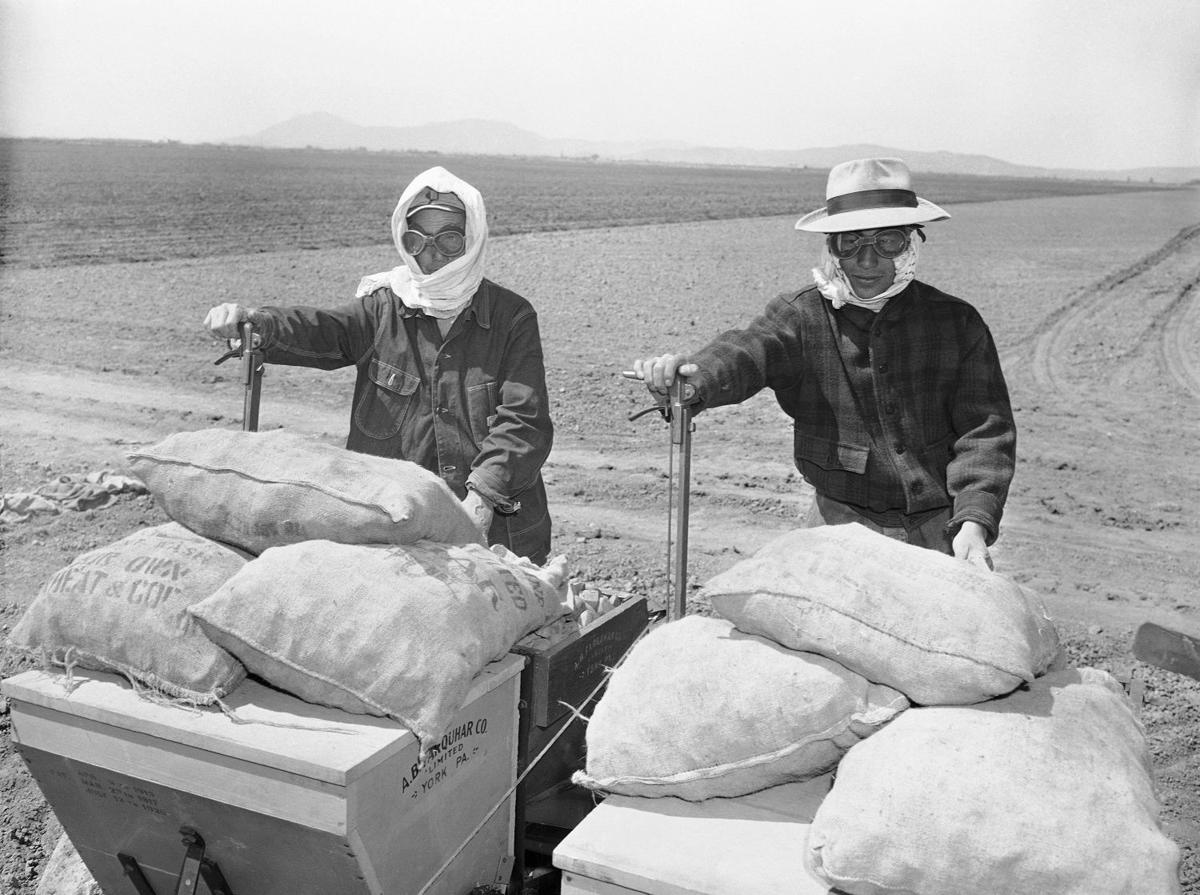|
http://www.heraldandnews.com/news/local_news/legislation-to-change-tule-lake-status-offered/article_42bf295b-248e-5ccb-8dd7-4006c5784b4e.html
Legislation to change Tule Lake status offered
by LEE JUILLERAT, Herald and News Jan 7, 2016
Camp Tule Lake
 These
Japanese internees work as operators on a seed potato planting
machine in Tulelake, Calif., May 23, 1943. Legislation was
recently introduced by Sen. Barbara Boxer, D-Calif., to
establish the former Tule Lake Detention Center, Peninsula and
Camp Tulelake as a historic site. These
Japanese internees work as operators on a seed potato planting
machine in Tulelake, Calif., May 23, 1943. Legislation was
recently introduced by Sen. Barbara Boxer, D-Calif., to
establish the former Tule Lake Detention Center, Peninsula and
Camp Tulelake as a historic site.
Legislation to establish the Tule Lake National Historic Site
that was recently introduced by Sen. Barbara Boxer, D-Calif.,
would create the Tule Lake Unit as separate from the existing
World War II Valor in the Pacific National Monument.
Larry Whalon, superintendent for the Tule Lake Unit and Lava
Beds National Monument, said if Boxer’s proposal is approved,
the three sites that make up the unit would be known as the Tule
Lake National Historic Site. It would include the former Tule
Lake Detention Center, Peninsula and Camp Tulelake.
Tule Lake was the largest “War Relocation Authority” camp during
World War II, incarcerating nearly 19,000 Japanese-Americans.
The Peninsula includes an area where incarcerated
Japanese-Americans were allowed to hike until Tule Lake became
the nation’s only high-security segregation center.
Incarceration camps
The Tule Lake Unit is one of several sites in the World War II
Valor in the Pacific National Monument created by President
George W. Bush in 2008. If approved, the legislation would
elevate the Tule Lake Camp in equal recognition with other
incarceration camps that are also preserved and managed by the
NPS.
Others with that recognition include Manzanar National Historic
Site in California and Minidoka National Historic Site in Idaho.
“It’s good news in that Tule Lake would be a unit by itself,”
Whalon said. “If nothing else, it shortens the name,” he added
with a laugh.
Since its creation, the Tule Lake Unit has shared staff with
Lava Beds. While Whalon would still oversee both Tule Lake and
Lava Beds, he said the designation would help the Tule Lake Unit
become more independent and eliminate some of staffing and
maintenance sharing issues. The designation, he emphasized,
would not enlarge or change boundaries of the Tule Lake Unit.
“For the purpose of operations it would make things quite a bit
easier,” Whalon said of managing the Tule Lake Unit. He noted a
general management plan is currently being created. He expects
the draft plan will be available for public review and comment
in May.
Others praised Boxer’s proposal.
“This legislation will give Tule Lake the national recognition
it deserves, while honoring the tens of thousands of
Japanese-Americans who were forcibly relocated and incarcerated
in one of our country’s darkest moments,” Boxer said in a press
release.
Sharing history
“Senator Boxer’s bill will distinguish the Tule Lake Camp as a
nationally significant historic site, for which we are
grateful,” said Barbara Takei of the Tule Lake Committee, which
represents survivors of the wartime incarceration and their
descendants. “The senator’s efforts will help educate Americans
about a period of American history that we trust will never be
repeated.”
“National Parks Conservation Association applauds Senator
Boxer’s legislation to establish Tule Lake National Historic
Site, joining Manzanar and Minidoka in our National Park System
to connect visitors to our country’s history and the injustices
that Japanese-Americans faced during World War II,” said Ron
Sundergill, Pacific Region senior director of the National Parks
Conservation Association.
Since the Tule Lake Camp was included in the National Monument
in 2008, people have expressed concerns the name of the monument
— World War II Valor in the Pacific — was inappropriate for a
site aimed at remembering the incarceration of more than 110,000
Japanese-Americans, two-thirds of them American citizens, during
World War II.
Before President Bush created the World War II Valor in the
Pacific National Monument, Boxer, Sen. Dianne Feinstein and Rep.
Doris Matsui, all from California, sponsored legislation to
determine whether Tule Lake should be preserved as part of the
NPS.
The Tule Lake Unit includes three sites in two counties. Along
with Tule Lake, it includes the Camp Tulelake Civilian
Conservation Corps Camp, which also served as a prisoner of war
camp for German and Italian soldiers during World War II and
Peninsula-Castle Rock.
====================================================
In accordance with Title 17 U.S.C.
section 107, any copyrighted material
herein is distributed without profit or
payment to those who have expressed a
prior interest in receiving this
information for non-profit research and
educational purposes only. For more
information go to:
http://www.law.cornell.edu/uscode/17/107.shtml |

